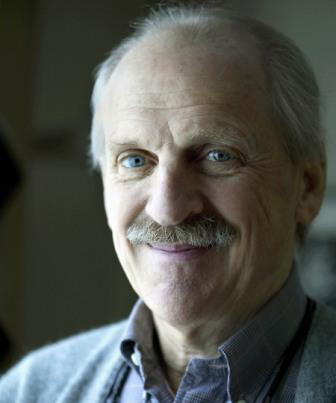Gratitude for Opportunities Leads to Gift for Undergraduate Research
James Meyerhoff, C’62, M’66, has created a fund that will support original research by Biological Basis of Behavior students.
James Meyerhoff, C’62, M’66, can name almost every person who helped him on his way to becoming a leading researcher in neurochemistry and neuroendocrinology. From the College to the School of Medicine (now Perelman School of Medicine) to Chicago to Walter Reed, he’s grateful to everyone whose support has touched his life and career. Now he’s endowed the James Lester Meyerhoff, M.D. Undergraduate Research Fund in the Biological Basis of Behavior program to continue that chain of care.
It all leads back to Penn, and a room Meyerhoff rented in a house filled with psychology grad students. Brad Bucher, GR’65, helped him learn statistics and shared his love of art and music. When Meyerhoff was interested in physiological psychology but the professor, Philip Teitelbaum, was on sabbatical, another housemate, Jay Singer, GR’66, arranged an introduction. Despite the sabbatical, Teitelbaum accepted Meyerhoff for independent study, which Meyerhoff calls “the most influential experience in my undergraduate studies.” Bart Hoebel, GR’62, a graduate student in Teitelbaum’s lab, became his “friend, role model, and mentor.” Meyerhoff adds, “And in addition to great psychology courses, Penn’s Department of Chemistry was superb.”
While in medical school, medicine with Beaupre and neurology with Bevilaqua, as well as summers in Britton Chance’s lab with Frans Jobsis, all contributed to Meyerhoff’s professional growth and a diverse toolkit. But ultimately it was the independent study at the College that directed his course after medical school. He believed that the then-emerging field of neuroscience would become the underpinning of both psychology and neurology. Work with patients during his residency at the University of Chicago further sharpened his focus to neurochemistry, and he flew to Carlsson’s lab in Sweden to learn assays for monamines.
When Meyerhoff accepted a position at the Walter Reed Army Institute of Research, his supervisor and commanding officer, psychiatry pioneer David Rioch, asked him what he wanted to do. Meyerhoff answered, “Neurochemistry,” and Rioch pointed out that Walter Reed didn’t have a neurochemistry lab. Meyerhoff responded, “Well, perhaps you need one.” Three days later, Rioch gave him the go-ahead to build a neurochemistry lab, and sent him to do a postdoctoral fellowship at Johns Hopkins with Solomon Snyder.
During his long career, Meyerhoff created a safe, ethical, and repeatable paradigm to measure stress by studying solders going through Soldier of the Month Board interviews (a kind of dress rehearsal for promotion boards—he got the idea after his own board examinations in psychiatry.) With colleagues, he published the first finding of stress-induced elevated plasma levels of beta endorphin in normal males, and received an Army research and development award. He helped to create an animal model of PTSD that is still in use for brain regional omics studies with colleagues. In 2007, Meyerhoff and John Hansen of the University of Texas at Dallas were awarded a U.S. patent for measuring stress in the human voice. He has received the Achievement Medal for Civilian Service from the Army. While continuing his research on PTSD, he is also trying to create a career path for retiring military behavior health technicians to work in civilian community mental health.
Now the Meyerhoff Fund will give students the same early exposure to research, which he says is vital. “I believe it is important for students to be exposed early to emerging trends in bioscience, before the student has made a commitment to a particular specialty. My lab courses were superb, but it is important to see first-hand how laboratory techniques are harnessed in pursuit of specific clinically-relevant questions.”
He also knows how much undergraduates can benefit from informal contact with graduate students. “The combined exposure to a brilliant senior professor and a brilliant, quite approachable, and very generous near-peer graduate student was a powerful, fortuitous experience.”
Now a clinical professor of psychiatry at Georgetown University and the Uniformed Services University of the Health Sciences, Meyerhoff says he himself still has a lot to learn. He’ll be intersecting with more lives along the way—including those of future students at Penn whose own lives he may change.




